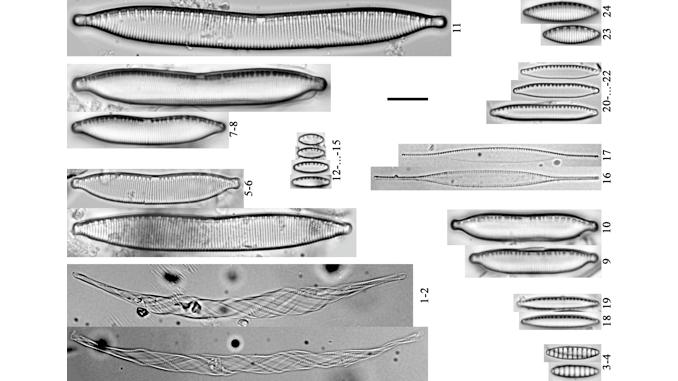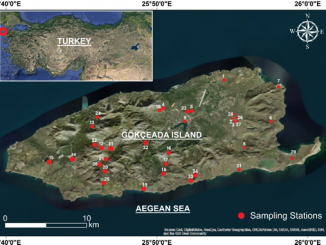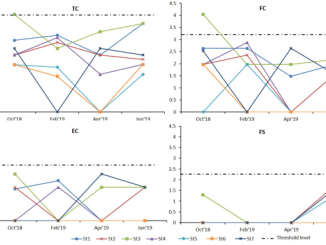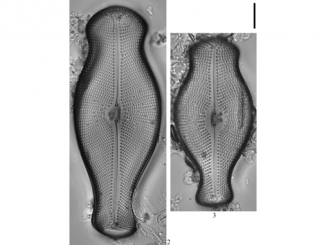
Paper category: Original research paper
Corresponding author: Cüneyt Nadir Solak (cnsolak@gmail.com)
DOI: 10.2478/ohs-2019-0014
Received: 19/05/2018
Accepted: 07/01/2019
Full text: here
Citation (APA style): Solak, C., Alakananda, B., Kulikovskiy, M., et al. (2019). Distribution of nitzschioid diatoms in Kütahya waters. Oceanological and Hydrobiological Studies, 48(2), pp. 140-164. Retrieved 3 Oct. 2019, from doi:10.1515/ohs-2019-0014
Abstract
The family of Bacillariaceae Ehrenberg is a group of well-known raphid diatoms, associated with water quality. Our current knowledge of the species diversity of this group in Turkey is still incomplete. There are three river basins in the Kütahya region in Turkey, located in the eastern part of the country, including the Gediz, Sakarya and Susurluk basins, thus the region is rich in lotic waters. We present each taxon based on our observations of specimens collected in the Kütahya region. A total of 53 sites were surveyed in this study and a total of 65 taxa from Bacillariaceae were identified. Of these 65 taxa, 15 are recognized as the first records for Turkey. For each taxon, we indicate the reference(s) used for its identification. To facilitate the identification by others working on the Turkish freshwater diatom flora, we also present dimensions of the taxa identified, the distribution of each taxon in the Kütahya region, the distribution of each taxon in Turkey as well as one or more figures for each taxon.
References
Açıkgöz, İ. & Baykal, T. (2005). Karagöl (Çubuk-Ankara) alg florası. S.D.Ü. Eğirdir Su Ürünleri Fakültesi Dergisi 1(2): 38–55.
Akbulut, N.E., Bayari, S., Akbulut, A. & Şahin, Y. (2009). Rivers of Turkey. In K. Tockner, C.T. Robinson & U. Uehlinger (Eds.), Rivers of Europe (pp. 643–672). Oxford: Elsevier Ltd.
Alakananda, B., Karthick, B., Mahesh, M.K. & Ramachandra, T.V. (2011). Diatom-based pollution monitoring in urbanwetlands. The IUP Journal of Soil and Water Sciences 4(2): 1–17.
Alakananda, B., Mahesh, M.K., Hamilton, P.B., Supriya, G., Karthick, B. et al. (2012). Two new species of Nitzschia (Bacillariophyta) from shallow wetlands of Peninsular India. Phytotaxa 54: 13–25.
Alakananda, B., Karthick, B., Taylor, J.C. & Hamilton, P.B. (2015). Two new species of Nitzschia (Bacillariophyceae) from freshwater environs of Lonar Crater Lake, India. Phycological Research 63 (1): 29–36.
Anonymous (2017). Environmental report for Kütahya Province of 2016. Kütahya Provincial Directorate of Environment and Urbanisation, Kütahya, 153 pp. (In Turkish).
Archibald, R.E.M. (1966). Some new rare Nitzschiae (Diatomaceae) from the Vaal Dam Catchment area (South Africa). Portugaliae Acta Biologica Séries 8: 227–238.
Archibald, R.E.M. (1972). Diversity in some South African diatom associations and its relation to water quality. Water Res. 6: 1229–1238.
Atıcı, T. (1997). Sakarya Nehri Kirliliği ve Algler. Ekoloji Dergisi 24: 28–32.
Atıcı, T. & Ahıska, S. (2005). Pollution and algae of Ankara Stream. G.U. Journal of Science 18(1): 51–59.
Atıcı, T. & Obalı, O. (2010). The diatoms of Asartepe Dam Lake (Ankara), with environmental and some physicochemical properties. Turk. J. Bot. 34: 541–548.
Atıcı, T., Özçelik, N., Korkmaz, B., Uğurlu, E. & Selçuk, A. (2008). Çanıllı Baraj Gölü (Ankara) mikroalgleri. Biyoloji Bilimleri Araştırma Dergisi 1(2): 45–48.
Bąk, M., Witkowski, A., Żelazna-Wieczorek, J., Wojtal, A.Z., Szczepocka, E. et al. (2012). Klucz do Oznaczania Okrzemek w Fitobentosie na Potrzeby Oceny Stanu Ekologicznego wód Powierzchniowych w Polsce. Warszawa: Biblioteka Monitoringu Środowiska.
Baykal, T., Akbulut, A., Açıkgöz, İ., Udoh, A.U., Yıldız, K. et al. (2009). New Records for the Freshwater Algae of Turkey. Turkish Journal of Botany 33: 141–152.
Baytut, Ö. & Gönülol, A. (2016). Phytoplankton distribution and variation along a freshwater-marine transition zone (Kızılırmak River) in the Black Sea. Oceanological and Hydrobiological Studies 42: 406–411.
Bere, T. & Tundisi, J.G. (2011). Diatom based water quality assessment in streams influenced by urban pollution: Effects of natural and the selected artificial substrates. Brazilian Journal of Aquatic Science and Technology 15(1): 54–63.
Bey, M-Y. & Ector, L. (2013). L’Atlas des diatomées des cours d’eau de la région Rhône-Alpes est consultable sur le site internet de la DREAL Rhône-Alpes: www.rhone-alpes.developpement-durable.gouv.fr
Beyene, A., Addis, T., Kifle, D., Legesse, W., Kloos, H. et al. (2009). Comparative study of diatoms and macroinvertebrates as indicators of severe water pollution: case study of the Kebena Akaki rivers in Addis Ababa, Ethiopia. Ecological Indicators 9: 381–392.
Blackburn, M.V., Hannah, F. & Rogerson, A. (2009). First account of apochlorotic diatoms from intertidal sand of a south Florida beach. Estuarine, Coastal and Shelf Science 84(4): 519–526. DOI: 10.1016/j.ecss.2009.07.012.
Cleve, P.T. & Grunow, A. (1880). Beiträge zur Kenntniss der Arctischen Diatomeen. Kongliga Svenska-Vetenskaps Akademiens Hlingar 17(2): 121 pp.
Cleve-Euler, A. (1951–1955). Die Diatomeen von Scheweden und Finnland. Kongliga Svenska vetenskaps-Akaademiens Handlingar ser. 4, 2/1: 1–163 (1951); 3/3: 1–153 (1952); 4/1:1–158; 4/5:1–255 (1953); 5/4: 1–232 (1955).
Çelekli, A. & Külköylüoğlu, O. (2006). Net planktonic diatom (Bacillariophyceae) composition of Lake Abant (Bolu). Turk. J. Bot. 30: 331–347.
Dere, Ş., Karacaoğlu, D. & Dalkıran, N. (2002). A study on the epiphytic algae of the Nilüfer Stream (Bursa). Türk. Bot. Derg. 26: 219–234.
Dere, Ş., Dalkıran, N., Karacaoğlu, D., Elmacı, A., Dülger, B. et al. (2006). Relationships among epipelic diatom taxa, bacterial abundances and water quality in a highly polluted stream catchment, Bursa-Turkey. Environm. Monit. Assessm. 112: 1– 22.
Ehrenberg, C.G. (1844). Untersuchungen über die kleinsten Lebensformen im Quellenlande des Euphrats und Araxes, so wie über eine an neuen Formen sehr reiche, marine Tripelbildung von den Bermuda-Inseln. Ber. Verh. Königl. Preuss. Akad. Wiss. Berlin 1844: 253–275.
Fourtanier, E. & Kociolek, J.P. (2011). Catalogue of Diatom Names, California Academy of Sciences. On-line Version updated 19 September 2011. http://research.calacademy.org/research/diatoms/names/index.asp
Gönülol, A. (2017). Turkish algae electronic publication, Samsun, Turkey. http://turkiyealgleri.omu.edu.tr
Grunow, A. (1862). Die österreichischen Diatomaceen nebst Anschluss einiger neuen Arten von ern Lokalitäten und einer kritischen Uebersicht der bisher bekannten Gattungen und Arten. Erste Folge. Epithemieae, Meridioneae.
Gtiner, H. (1966). Microflora of Pamukkale thermal spring. Ege University Faculty of Science Reports Series 31: 1–35.
Hlúbikova, D., Blanco, S., Falasco, E., Gomá, J., Hoffman, G. et al. (2009). Nitzschia alicae sp. nov. and N. puriformis sp. nov., new diatoms from European rivers and comparison with the type material of N. sublinearıs and N. pura. Jornal of Phycology 45: 742–760.
Hofmann, G., Werum, M. & Lange-Bertalot, H. (2011). Diatomeen im Süßwasser-Benthos von Mitteleuropa. Bestimmungsflora Kieselalgen für die ökologische Praxis. Über 700 der häufigten Arten und ihre Ökologie. A.R.G. Gantner Verlag K.G., Rugell.
Hustedt, F. (1930). Die Kieselalgen Deutschlands, Österreichs und der Schweiz. Dr. L. Rabenhorsts Kryptogamenflora von Deutschland, Österreich und der Schweiz, Band 7, Teil 1, Lief. 5, 785–920. Leipzig: Akademische Verlagsgesellschaft.
Hustedt, F. (1955). Neue und wenig bekannte Diatomeen. 8 Abh. naturw. Ver. Bremen 34(1): 47–68.
Kalyoncu H., Dayıoğlu H. & Kılçık F. (2014). Using diatoms in water quality assessment in the Andık Stream (Isparta-Turkey). Fresenius Environmental Bulletin 25(12): 5237–5244.
Kociolek, J.P., Laslandes, B., Bennett, D., Thomas, E., Brady, M. et al. (2014). Diatoms of the United States, 1. Taxonomy, ultrastructure and descriptions of new species and other rarely reported taxa from lake sediments in the western U.S.A. Bibliotheca Diatomologica 61: 1–188.
Kociolek, J.P., Spaulding, S.A. & Lowe, R.L. (2015). Bacillariophyceae: The Raphid Diatoms. In J.D. Wehr, R.G. Sheath & J.P. Kociolek (Eds.), Freshwater Algae of North America (pp. 709–772). San Diego: Academic Press.
Krammer, K. & Lange-Bertalot, H. (1991). Bacillariophyceae, 2. Teil: Bacillariaceae, Epithemiaceae, Surirellaceae. Süßwasserflora von Mitteleuropa 2(2): 1–596.
Lange-Bertalot, H. (1993). 85 new taxa and much more than 100 taxonomic clarifi cations supplementary to Suβwasserflora von Mitteleuropa. 2(1–4). Bibliotheca Diatomologica 27. J. Cramer, Berlin–Stuttgart.
Lange-Bertalot, H. & Simonsen, R. (1978). A taxonomic revision of the Nitzschia lanceolata Grunow. 2. European and related extra European freshwater and brackish water taxa. Bacillaria 1: 11–111.
Legler, F. & Krasske, G. (1940). Diatomeen aus dem Vannsee (Armenien). Beiträge zur Ökologie der Brackwasserdiatomeen I. Beihefte zum Botanischen Centralblatt 60: 335–345.
Mann, D.G. (1978). Studies in the Family Nitzschiaceae (BacilLariophyla). Ph.D. Dissertation. University of Bristol, Bristol, U.K 2 vols.
Mann, D.G. (1999). The species concept in diatoms. Phycologia 38: 437–495.
McPherson, B.F. (1996–98). Water Quality in Southern Florida: Florida, 1996–98. B.F. McPherson – Google Books. (n.d.). Retrieved June 5, 2017.
Metzeltin, D. & Witkowski, A. (1998). Tropical diatoms of South America I. Iconographia Diatomologica 5: 1–695.
Nikulina, T.V. & Kociolek, J.P. (2011). Diatoms from hotsprings from Kuril and Sakhalin Islands (Far East, Russia). In J.E.Seckbach & J.P. Kociolek (Eds.), The Diatom World. Cellular Origin, Live in Extreme Habitats and Astrobiology, volume: 19 (pp. 335–363). Springer.
Ongun-Sevindik, T. & Gönülol, A. (2011). Twenty New Records for Turkish Freshwater Algal Flora from Çaygören and Ikizcetepeler Reservoirs (Balıkesir, Turkey). Turkish Journal of Fisheries and Aquatic Science 11: 399–406.
Öterler, B., Kırgız, T. & Albay, M. (2014). Seasonal variations of water quality parameters and algal flora of Tundzha (Tunca) River (Edirne, Turkey). Opern Journal of Ecology 4: 807–819.
Özer, T., Açıkgöz, İ., Solak, C.N. & Udoh, A. (2018). Diversity and Ecology of Algae from Melen River (Western Black Sea River Catchment) in Turkey. Turkish Journal of Fisheries and Aquatic Sciences 18: 1187–1119.
Round, F.E., Crawford, R.M. & Mann, D.G. (1990). The diatoms. Biology and morphology of the genera. Cambridge University Press, Cambridge. 747 pp.
Schneider, C.A., Rasband, W.S. & Eliceiri, K.W. (2012). NIH Image to ImageJ: 25 years of image analysis. Nature methods 9(7): 671–675.
Sıvacı, R.E. (2013). Nutrient, benthic algae relationships in the Sinop Karagöl-Aksaz Marsh, Turkey. African Journal of Agricultural Research 8(13): 1129–1135.
Sıvacı, R.E., Kılınç, S. & Dere, Ş. (2007). Relationship between epipelic diatom taxa (Bacillariophyceae) and nutrients in two karstic lakes in Central Anatolia, Turkey. Journal of Freshwater Ecology 22(3): 515–520.
Sıvacı, E.R., Yardım, Ö. Gönülol, A., Bat, L. & Gümüş, F. (2008). Sarıkum (Sinop–Türkiye) Lagününün bentik algleri. Journal of Fisheries Sciences 2(4): 592–600.
Skuja, H. ( 1937). Süsswasseralgen aus Griechenland und Kleinasien. Hedwigia 77 :15–73.
Smith, W. (1853). Synopsis of British Diatomaceae 1. Van Voorst, London, 89 pp., 31 pls.
Smith, W. (1856). Synopsis of British Diatomaceae 2. Van Voorst, London, 107 pp., 30 pls.
Solak, C.N. & Wojtal, A.Z. (2012). The diatoms in springs and streams of the Türkmen Mountain (Sakarya River Basin), commonly reported from Turkish inland waters. Polish Botanical Journal 57(2): 375–425.
Solak, C.N., Kulikovskiy, M., Kaleli, A. & Gönülol, A. (2016). Rare and new records for diatoms of Turkey from Kütahya running waters. Oceanological and Hydrobiological Studies 45(4): 564–587.
Solak, C.N., Kulikovskiy, M., Kiss, T.K., Kaleli, A., Kociolek, J.P. et al. (2018). The distribution of centric diatoms in different river catchments in the Anatolian Peninsula, Turkey. Turkish Journal of Botany 42(1): 100–122.
Taylor, J.C., Archibald, C.G.M. & Harding, W.R. (2006). An Illustrated Guide to Some Common Diatom Species from South Africa. Water Research Commission.
Trobajo, R., Rovira, L., Ector, L., Wetzel, C.E., Kelly, M. et al. (2013). Morphology and identity of some ecologically important small Nitzschia species. Diatom Research 28: 37–59.
Tunca, H., Ongun-Sevindik, T., Bal, D.N. & Arabacı, S. (2014). Community structure of epiphytic algae on different macrophytes ar Acarlar floodplain forest (Northern Turkey). Chinese J. Ocean. and Limn. 32(4): 845–857.
Varol, M. & Şen, B. (2014). Dicle nehrinin planktonik alg florası. Journal of FisheriesSciences.com 8(4): 252–264.
Varol, M., Blanco, S., Alpaslan, K. & Karakaya, G. (2018). New records and rare taxa for the freshwater algae of Turkey from the Tatar Dam Reservoir (Elazığ). Turkish Journal of Botany 42: 533–542.
Van Dam H., Martens A. & Sinkeldam J. (1994). A coded checklist and ecological indicator values of freshwater diatoms from the Netherlands. Netherlands Journal of Aquatic Ecology 28: 117–133.
Witkowski, A., Żelazna-Wieczorek, J., Solak, C.N. & Kulikovskiy, M., (2014). Morphology, ecology and distribution of the diatom (Bacillariophyceae) species Simonsenia delognei (Grunow) Lange-Bertalot. Oceanonological and Hydrobiological Studies 43(4): 393–401.
Wojtal, A.Z. (2009). The diatoms of Kobylanka stream, a small watercourse near Kraków (Wyzyna Krakowsko-Czestochowska upland, S Poland). Polish Botanical Journal 54(2): 129–330.
Wojtal, A.Z. (2013). Species composition and distribution of diatom assemblages in spring waters from various geological formations in Southern Poland. Bibliotheca Diatomologica 59: 1–436
Yıldız, K. (1987). Diatoms of the Porsuk River, Turkey. Doğa Tr. J. Biol. 11(3): 162–182.
Yıldız, K. & Atıcı, T. (1996). Ankara Çayı Diatomeleri. Gazi Üniv. Fen – Edebiyat Fak. Fen Bilimleri Dergisi 6: 59–87.
You, Q.M. & Wang, Q.X. (2011). Newly recorded species of Nitzschia and Denticula (Bacillariophyta) from Xinjiang, China. Acta Botanica Boreali-Occidentalia Sinica 31: 417–422.
Zidarova, R., Van de Vijver, B., Quasada, A. & de Haan, M. (2010). Revision of the genus Hantzschia (Bacillariophyceae) on Livingston Island (South Shetland Islands, Southern Atlantic Ocean). Plant Ecology and Evolution 143(3): 318–333.




Bądź pierwszy, który skomentuje ten wpis